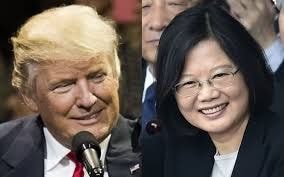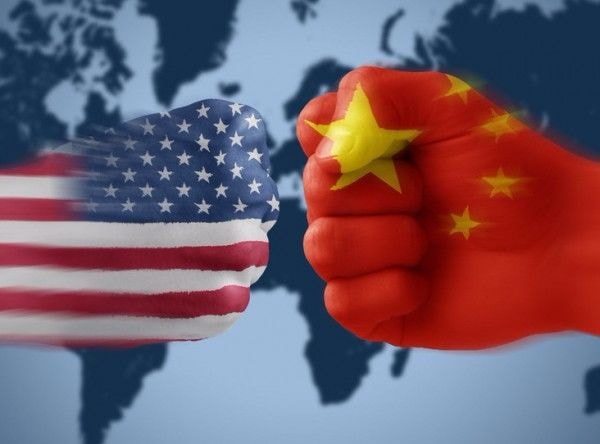'Dark shadow' of US-China relations under Trump
(Baonghean) - There are many reasons to suspect that US-China relations will fall into "bad weather" under the Donald Trump administration. Meanwhile, there are increasing signs that the Taiwan issue and the trade sector may potentially pose the strongest risks to US-China relations in the coming time.
Relations with Taiwan
Tsai Ing-wen, the head of the Taiwanese government, transited in the US during her trip to Latin American countries on January 8, causing Beijing to closely monitor every move. This is not the first time Tsai Ing-wen has "transited" in the US, but it is the time that makes China more worried. Immediately after winning the election, Mr. Donald Trump had a phone call with Tsai Ing-wen.
 |
| US President-elect Donald Trump and Taiwanese President Tsai Ing-wen. Photo AFP |
This is an unprecedented event in nearly four decades and inevitably makes China "hot-faced". After the phone call, Mr. Donald Trump questioned the "one China" policy - the most "sensitive" issue in the relationship between Washington and Beijing. It should be recalled that, since 1979, the US foreign policy stance has been to "recognize the Government of the People's Republic of China as the sole legitimate government of China, acknowledge the one China policy and Taiwan as part of China".
Therefore, if US President-elect Donald Trump changes his views and stance on diplomatic principles with China, this will be a "heavy blow" to the relationship that is full of storms and suspicions. American politicians and diplomats themselves have expressed concern about this issue. In his final weeks in office, President Barack Obama warned of a change that could lead to serious consequences in US relations with Beijing. Mr. Obama said, "the concept of 'one China' is central to their concept of the country and if they want to shake this concept, they need to carefully consider the consequences."
Recently, in a phone call with his Chinese counterpart Wang Yi, US Secretary of State John Kerry also reassured Beijing that “the US will continue to maintain the One China policy”. That is enough to show that Washington officials acknowledge the seriousness of the problem once the new President boldly plans a policy towards China. Therefore, even though he wants to make a “difference”, it is difficult for the 45th President of the US to upset or “turn around” any policy, including the foreign policy towards Beijing. According to observers, it is likely that Mr. Trump will consider Taiwan as a “card” in “bargaining” with China. If so, US-China relations will fall back into a state of “excessive suspicion and lack of trust”.
Trade "collision"
Not only the Taiwan issue, trade can also be the issue that causes the US-China "war". In recent days, Mr. Trump has selected a team to "weigh the scales" on US trade relations and those names all have a common view of being tough on China. Chinese press also admits that the "trio" Robert Lighthizer (US Trade Representative), Peter Navarro (Director of the White House National Trade Council) and Wilbur Ross (Minister of Commerce) joining forces in the new administration of President-elect Trump will likely change the trade order that the US is pursuing.
 |
| US-China relations could fall into “bad weather” under the Donald Trump administration. Photo: Getty Image |
With the pledge to “bring jobs back to America,” President-elect Trump can force large companies to limit production abroad, including China, and bring jobs back to the American people. Evidence is that the world’s leading car manufacturers such as Ford, Toyota or General Motor are being criticized by Mr. Trump for producing cars at low-cost factories in Mexico - which, as he says, is destroying American jobs. If a wave of businesses also leave China to return to the US, it will be a failure for the world’s second largest economy.
But what has given Beijing the biggest headache is that Mr. Trump once announced a 45% tax on Chinese exports or accused China of devaluing the yuan when he officially took office. Therefore, Chinese officials have thought about retaliation if the future Trump administration realizes its commitments. It is undeniable that if the US-China trade war breaks out, it will bring about a series of unpredictable consequences for the economies of the two countries in particular and the world in general.
Thanh Huyen

